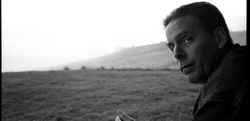Garland, Peter
Biography
Born: January 27, 1952
Country: Portland, Maine, U.S.A.
Studies: California Institute of the Arts (B.F.A.1972)
Teachers: Harold Budd, James Tenney
Peter Garland (born January 25, 1952 in Portland, Maine) is a composer best known for publishing Soundings Press, one of the few sources of new music scores and articles while in print. A student of James Tenney and Harold Budd, much of Garland's work could be considered post-minimal although many of his postminimal works such as "The Days Run Away" (1971) were written in the early 1970s at the same time as the first minimalist works. He is also an expert on American Indian music. He is the author of Gone Walkabout: Essays 1991-.
Peter Garland started his Soundings Press series in 1971 after attending a publishing workshop with Dick Higgins at CalArts.
He lives in Bath, Maine.[1]
American composer Peter Garland was born in Portland, Maine, in 1952. He began composing before the age of 20 while studying under Harold Budd and James Tenney at Cal Arts in the early 1970s. During this time, Garland also studied performance art and video with Wolfgang Stoerchle, and American literature with poet Clayton Eshleman. Garland has had at least four recordings of his compositions released by labels including Tzadik, New Albion and Avant. In addition to composing, Garland is also a musicologist and essayist. As a musicologist, he specializes in traditional U.S. and Mexican musics and 20th century American composers. He researched while living in Mexican villages for some years during the 1970s and 1990s. Garland spent the '80s in Santa Fe, where he had his own performing ensemble and could also study Southwestern Indian and Hispanic musical traditions. In 1991, he ceased publishing Soundings Press, a unique source of new music information and new composers' scores. He then traveled the world for four years, visiting twelve countries over five continents. These travels yielded Garland's third book of published essays, Gone Walkabout. Garland also authored a six volume work, Collected Studies of Nancarrow & Paul Bowles. In 1997, Garland returned to Mexico to compose, work on his fourth book of essays and study Jarocho music and culture. The Tzadik label released an album of solo piano works in early 2000 called the Days Run Away.[2]
Works for Percussion
Another Sunrise - Percussion Quartet; Pianos (2)
Apple Blossom - Percussion Quartet; Marimba Quartet
Coyote's Bones - Marimba; Violin; Piano
Dancing on Water - Marimba; Clarinet
Frieze (Dance of Huitzilophchtli) - Percussion Quartet
Hummingbird Songs 1-10 - Percussion Quartet
I Have Had to Learn the Simplest Things Last - Percussion Trio; Piano
Nana & Victorio - Multiple Percussion
Obstacles of Sleep - Percussion Duo; Piccolo
Penasco Blanco - Vibraphone; Piano
The Three Strange Angels - Multiple Percussion; Piano
Three Dances from the Conquest of Mexico - Multiple Percussion; Recorder
Three Songs of Mad Coyote - Percussion Quartet
References
- ↑ Peter Garland Bio2 Retrieved 5/25/2012
- ↑ Peter Garland Bio2 Retrieved 5/25/2012
